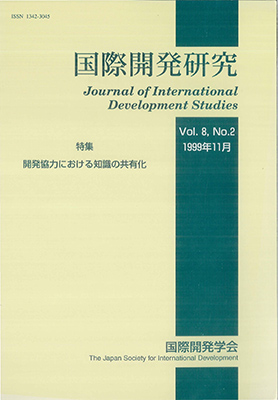8 巻, 2 号
選択された号の論文の8件中1~8を表示しています
- |<
- <
- 1
- >
- >|
特集 開発協力における知識の共有化
-
1999 年 8 巻 2 号 p. 1-4
発行日: 1999/11/30
公開日: 2020/03/28
PDF形式でダウンロード (210K)
論文
-
1999 年 8 巻 2 号 p. 5-18
発行日: 1999/11/30
公開日: 2020/03/28
PDF形式でダウンロード (784K) -
1999 年 8 巻 2 号 p. 19-28
発行日: 1999/11/30
公開日: 2020/03/28
PDF形式でダウンロード (548K) -
1999 年 8 巻 2 号 p. 29-43
発行日: 1999/11/30
公開日: 2020/03/28
PDF形式でダウンロード (799K) -
1999 年 8 巻 2 号 p. 45-57
発行日: 1999/11/30
公開日: 2020/03/28
PDF形式でダウンロード (764K) -
1999 年 8 巻 2 号 p. 59-70
発行日: 1999/11/30
公開日: 2020/03/28
PDF形式でダウンロード (664K)
一般投稿
論文
-
1999 年 8 巻 2 号 p. 71-87
発行日: 1999/11/30
公開日: 2020/03/28
PDF形式でダウンロード (984K)
報告
-
1999 年 8 巻 2 号 p. 89-105
発行日: 1999/11/30
公開日: 2020/03/28
PDF形式でダウンロード (769K)
- |<
- <
- 1
- >
- >|
